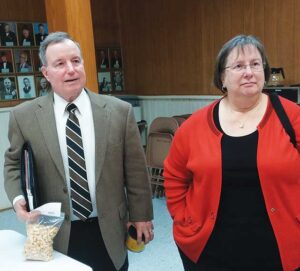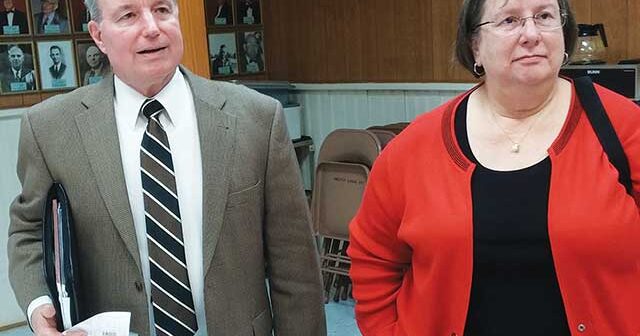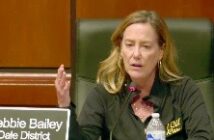During a recent Chester Lions Club meeting, Retired Army Maj. Gen. Merdith “Bo” Temple shared his insights into the life and accomplishments of George Washington. The information Temple shared focused on Washington as a farmer, an innovator, and someone concerned with building the nation through commerce and trade, information frequently left out of history books.

retired army maj. gen. Merdith “Bo” temple and Nancy Temple
Washington was primarily home-schooled and self-taught as a surveyor who inherited Mount Vernon, where initially tobacco was grown. In 1753, Washington joined the battles of the French and Indian War on the northwest frontier, where he acquired much of his military acumen. After the war, he returned home and married Martha Dandridge Custis. Washington was a farmer, and he became a wealthy landowner as he acquired property for his military service, got 6,000 acres from his wife, and purchased other real estate. He became a member of the Virginia House of
Burgesses in 1758 and worked to balance trade between Great Britain and the colonies.
Most people know about the Industrial Revolution but have never heard of the “agricultural” revolution of which Washington was a leader. He was likely the first to make compost from manure, fish heads, plaster of Paris, and mud. He strongly advocated the use of selective breeding of livestock, keeping records of each animal, and the use of mules instead of horses in farming because they ate less and were stronger. Washington stopped growing tobacco, which exhausted the soil, and raised wheat instead. He built a 16-sided threshing barn and a grist mill. By 1791, the grist mill could produce 5,000 to 8,000 pounds of flour and cornmeal in a single day. The flour and cornmeal he produced became a commodity which was sold both domestically and abroad. By 1798, Washington’s income was supplemented by a distillery that produced 11,000 gallons of rye whiskey which sold for roughly $7,500.
During and after the war, Washington was concerned about clothing and feeding his troops and all citizens and providing safe roads and waterways. His first term was focused internally by dealing with the nation’s debt, establishing a National Bank, and encouraging trade at home and abroad. Washington’s second term was focused on external affairs while maintaining neutrality and making equitable trade agreements.
Washington did not believe that slavery was a good economic model and freed his slaves in his will.
The Lions gained valuable knowledge regarding a very important historic American and had the pleasure of meeting another noteworthy American who has served this great country and continues to serve its citizenry. His charming wife, Nancy, obviously encourages his endeavors, and she is an absolute delight.


